Leros: The Underrated Greek Island that Has It...
Discover Leros, a hidden Greek island...
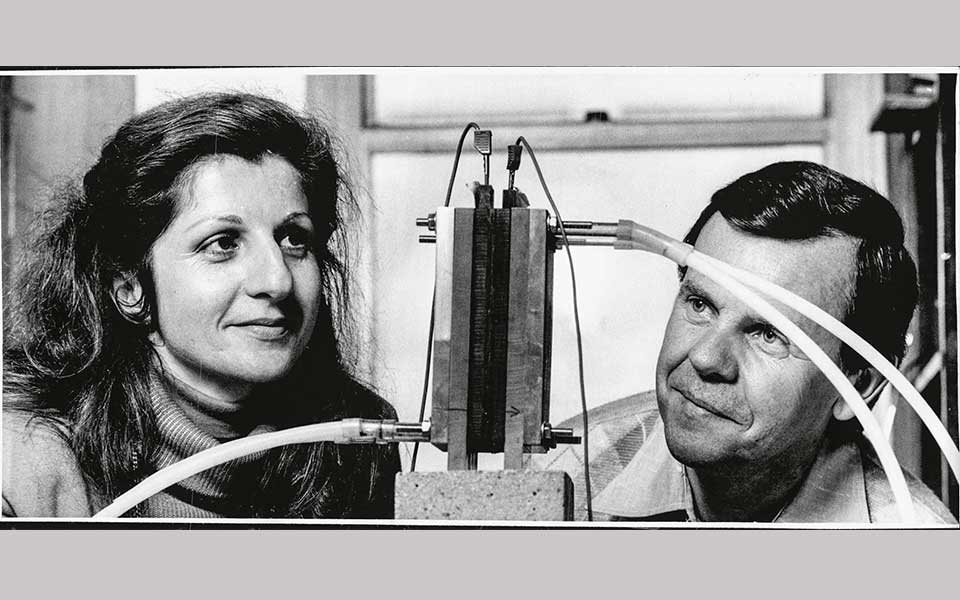
Maria Skyllas-Kazacos
© Getty Images/Ideal images
Emeritus Professor of Chemical Sciences and Engineering, University of South Wales. A Member of the Order of Australia for her service to science and technology. (New South Wales)
“My life as a Kazzie by marriage”
I was born in Kalymnos and migrated to Australia with my family at the age of two and a half. My father had grown up in Egypt, and my mother’s family came from a Greek community in Asia Minor, so I grew up with a strong Greek-Australian identity, but without any particular affinity to a specific part of Greece. My husband Michael Kazacos, on the other hand, who made me a “Kazzie-by-marriage,” is part of a large Kastellorizian-Australian extended family who, like so many other Kastellorizians, came to Australia to work hard and build a better life for their families. As I came to know that extended family, I began to understand their deep-rooted love for and loyalty to their island.
In 1985, Michael, our sons Nick and George and I set off to visit my own relatives in Kalymnos and to find our way to Kastellorizo. We travelled to Rhodes and, after some difficulties, got onto a ferry that departed for Kastellorizo at 3 am one morning. After seven hours sailing on relatively rough seas, we finally caught sight of a small island in the distance. The light morning haze caused the sea to merge with the sky, so to my eyes, it seemed that I was looking at a mystical land floating in the ether.
As we got closer to the island and started to turn into the harbor, I was overcome with emotion as the small buildings and boats came into view – it felt as if we’d been transported to a different world, a different time. Suddenly I knew why this tiny jewel in the Aegean Sea meant so much to its people and even to their descendants who had never known it.
Since that first visit to Kastellorizo in 1985, Michael and I were able to spend a few days on the island again in 2011 and, in 2014, our son George took his wife to see his ancestral land as part of their honeymoon to Greece and Europe. In 2018, we made a point of taking our youngest son Anthony for his first visit to the land of his forefathers. The effect on him was magical, as he explored the island and heard stories of his grandparents from some of the locals. We pray that, one day soon, we’ll be able to travel together to Kastellorizo with all three of our sons and their respective families, and to pass on the flame by introducing the island to our grandchildren as well.
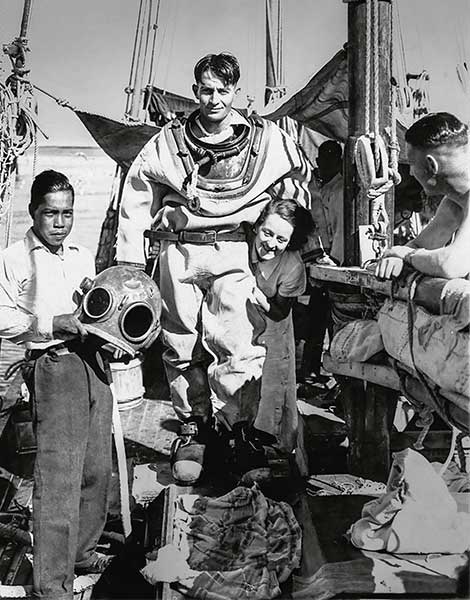
Nicholas Paspaley Sr. with his sister Mary circa 1937. He was only 19 years old when he bought his very first pearling lugger.
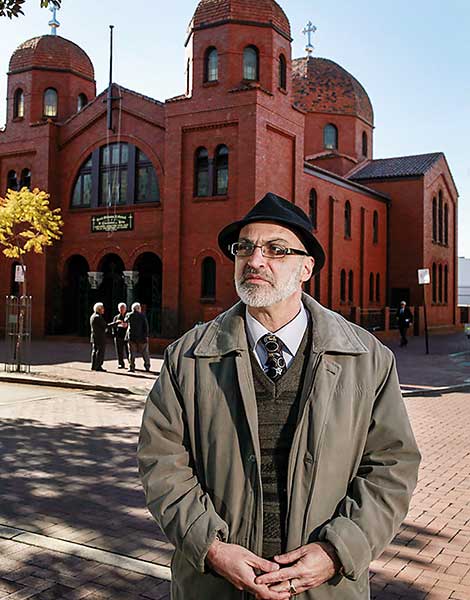
Dr John Yisnnakis
Head of the Paspaley Group. (Darwin)
“I think of Kastellorizo as my patriarch”
My father passed away in 1984. He was very close and dear to me, and I am conscious that I exist because of him. My father existed because of Kastellorizo, so in a real sense I view Kastellorizo and my father as being the same thing. In this way, when I think of my father, I also think of Kastellorizo as my patriarch.
As I’ve grown older, I have come to recognize my father’s traits in me. Interestingly, even those traits that are distinctly my own, I often consider how they differ from, or were influenced by, my father. In other words, I believe my roots are distinctly Kastellorizian.
I have very close friends in Australia who, coincidentally, also have roots in Kastellorizo. It’s interesting how successful those friends have become, just as my father was successful in his life.
If asked how I identify myself: I simply consider myself as a Kastellorizian who is an Australian citizen.
Well-known historian and academic. (Perth)
“A central aspect of my being”
As a youngster in Western Australia I was aware of its Greek world, though not appreciative of it or the Kastellorizian presence within it. This awareness came in my mid-teen years. Yet it is this duality, which as a youngster troubled me, that makes being a Kazzie in Perth special: the ability to traverse the Greek and Anglo-Australian worlds.
The importance placed on family, religion and the value of education helped shape me. Earlier generations, with their attempts at cultural, linguistic and religious maintenance in an environment that was often hostile, have allowed for a degree of cultural perseverance. Certainly, growing up in pre-multicultural Australia had its challenges. Yet, I knew there was something special and worthwhile about my Greek background, although at times as a teenager I tried to downplay it.
I came to realize that Greeks in this state, and Kastellorizians in particular, have made an extraordinary contribution at every level and in every sphere. From laborers to lawyers; academics to artists; entrepreneurs to sportspersons. In fact, the only non Anglo-Celt Governor of Western Australia has been a Kastellorizian. Despite their parochialism, there is a dynamism about Kastellorizians and a willingness to work for a greater good.
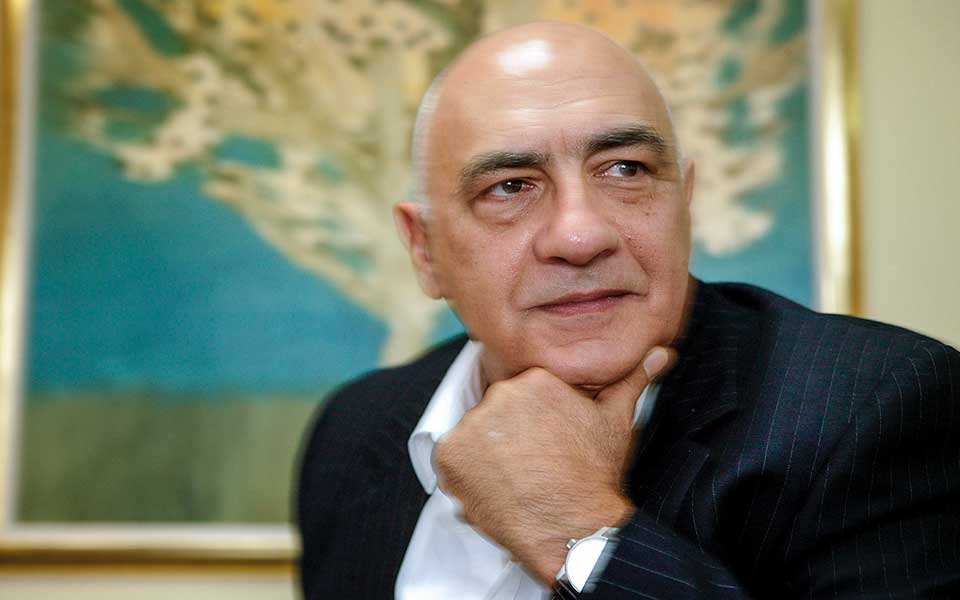
Kerry Harmanis
Mining magnate. (Darwin)
“These are my roots”
My great-grandfather Manolis Margaritis lived with his family on Kastellorizo from at least 1860. My grandfather and father were born there, and my mother’s father was born there, too, the family coming originally from near Smyrna (Izmir).
So these are my roots.
Being of Kastellorizian roots I have business, commerce and the sea in my blood, along with a strong and dynamic personality; I’m sometimes excitable, I love life, I laugh a lot and I work hard.
The Kazzie community in Australia has done very well in commerce, academia, business, leadership – anywhere politics and argument exist, or else we aren’t Greeks!
The community comes together to promote and support their Greek heritage
and their island home of Kastellorizo. A lot of money flows from Australia and the other Kastellorizian diasporas to the island. They have built houses and restored the island to the extent that it’s a very comfortable place now.
Kazzies are usually very family-focused, and follow all the Greek Orthodox traditions for Easter, weddings, christenings and other church events, as well as other traditions as we celebrate our Greek heritage.
Although we’re all busy in our own worlds, we still get together and are still close friends, no matter how long it’s been since we’ve seen each other.
It is a strong heritage we have, all leading back to our Greek island home of Kastellorizo.
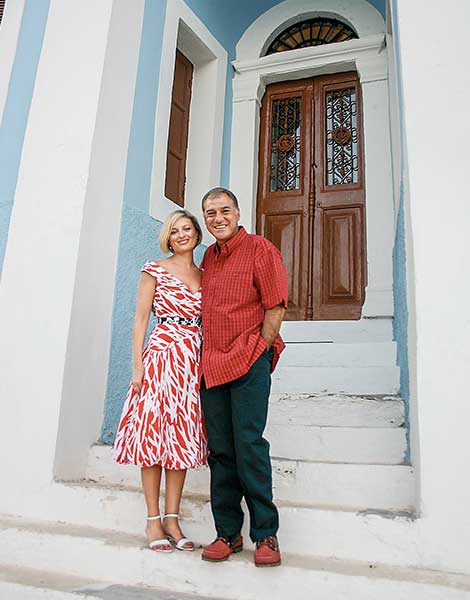
John Mangos

Dr Maria Kailis
TV presenter. (Sydney)
“The only place which brings me true happiness”
I grew up in Australia hearing wonderful stories of Kastellorizo’s tumultuous history. I learnt from an early age of its beauty, its majesty, its defiance, its pride, its triumphs and its tragedies; my mother is a survivor of the 1945 “Empire Patrol” disaster in which 33 people, mostly women and children, perished.
I’ve been a frequent visitor to the island over 40 years, and 10 years ago I became a part-resident after having built a home there. My family and friends all know it’s where I wish to be laid to rest. Why do I feel this way? I grew up in an environment where my family only socialized with the extended family and other Kastellorizians, holding picnics and name day celebrations. It was indeed insular, and it was somewhat competitive with those from other parts of Greece, too. A strong sense of patriotism and resilience developed. I was personally unaware that our culture, cuisine, music and dialect was different to other Greeks; I thought our way was the norm.
With this camaraderie came a strong sense of identity and pride.
My first visit in 1981 was highly emotional, after a buildup which dominated my youth. I remember that when I was purchasing my ferry ticket from Rhodes, the ticket agent asked me why I was bothering to go to such a place: “Performing your duty?” he suggested sarcastically. Offended, I told him I wanted to see where it all began, noting that I’d grown up hearing how my grandfather had been a sea-faring captain. “Everyone’s pappou was a captain,” was his cynical reply. It made me more determined to love the place.
Kastellorizo is not just in my blood. It is in my heart, my soul and my state of mind. I am known to say that my body lives in Australia but my true self lives in Kastellorizo.
I’ve always found it amusing that this microcosm which is Kastellorizo has defied convention by being so small and so diverse at the same time.
In Kastellorizo, the dimension of time becomes fluid. Past, present and future meld into each other, like the fragile ripples on the harbor at night, but there’s no confusion in this. There’s only a sense of unity, continuity and a magical variety. It’s alluring. And it’s so profoundly Greek, albeit within such visual proximity to Turkey.
A broader view is that Australia has been a country of incredible political stability. In contrast, Greece has not; Kastellorizo was occupied by five nations in 30 years. It is impossible for this not to bond those of us who “reside” here (in Australia) but “live” there (Kastellorizo). I am proud of the delicious irony that Australia, the country and the continent, has become a suburb of Kastellorizo, the island.
A well-known medical practitioner and the daughter of the late Michael Kailis of the seafood and pearl industries fame. (Perth)
“Family, heritage and a crazy love”
One of the most important memories of my life was seeing my dad, Michael George Kailis, crying on our first trip to Kastellorizo in 1975, as the ferry rounded the island to reveal the incredibly magical harbor. I had never seen him cry before.
My father could see the island needed revitalizing. With my mother, Patricia, and with the help of the architect George Murray, they poured love and effort into one of the first house restorations on the island. They also commissioned Dr Norman Ashton to research ancient Megisti. And no one will ever forget my sister Amanda’s tours of the patitiria (wine presses)!
I’m not exactly sure about what parts of my personality come from Kastellorizo, but I am sure my little stocky legs that love climbing up and down mountains come from there. In my office, I have pictures and paintings of the place to gaze at every afternoon, and I think about walking up the mountain to see the sun set or diving into the amazing blue waters.
The Kastellorizian community in Perth is very special. We’re linked by customs, by family and by our love of our island. At the very popular cooking classes of the Kastellorizian ladies’ association, we get to share traditions, family stories and good food!
Discover Leros, a hidden Greek island...
This spring, five majestic peaks across...
Discover Pyrgi in Chios, a medieval...
Patmos Aktis, Resort & Spa combines...